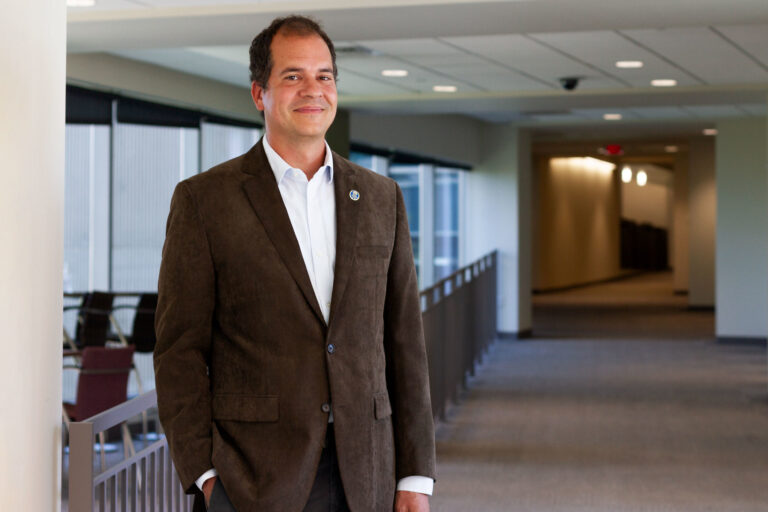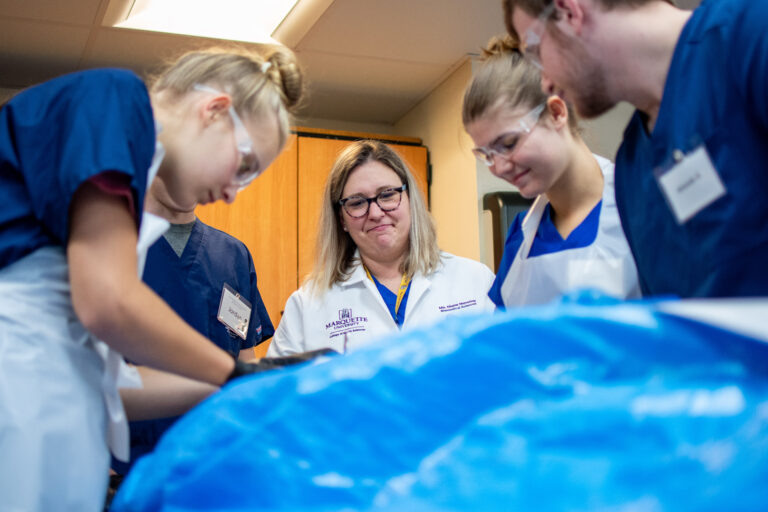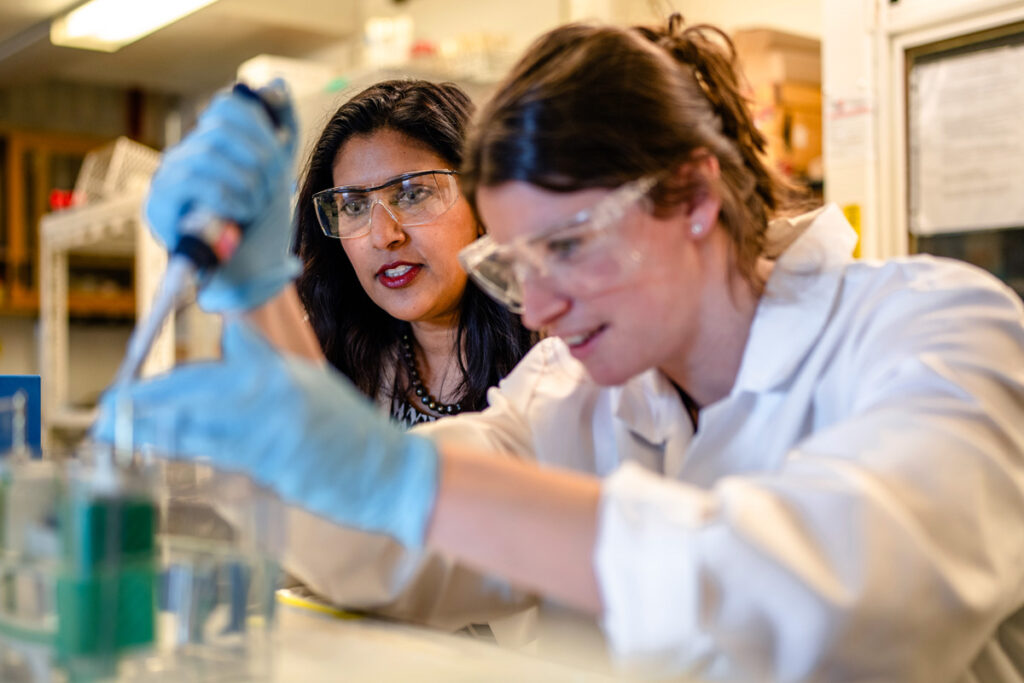
Dr. Anita Manogaran and junior Sean Martin prep liquid cultures to insert into a flow cytometer. Producing rapid results — a bright, fluorescent readout of 100,000 yeast cells in roughly a minute’s time — their experiment manipulates the genome of yeast cells to allow for easier, more identifiable findings.
It’s all to aid in the hunt for a very specific pattern — protein misfolding.
Proteins are essential for human life. However, as we age, proteins can misfold and aggregate, which can have detrimental effects on our bodies and lead to diseases such as Alzheimer’s, Parkinson’s and other aging disorders.
Understanding the natural ways that young cells can manage these rogue proteins is at the heart of Manogaran’s research, which is backed by a $990,000 four-year grant from the National Science Foundation. It’s giving her research interests in the molecular makeup of proteins and how they’re managed their day in the sun (or cytometer).
While Manogaran, associate professor of biological sciences and director of graduate studies in the Klingler College of Arts and Sciences trailblazes in her research discipline, she is also steadfast in her commitment to bring her students — undergraduate and graduate alike — along with her.
Students enrolled in biological sciences participate in faculty-mentored research at an even higher rate: one in three of all declared majors surveyed so far.
Ensuring students in the biological sciences receive an invaluable educational foundation and early research exposure, faculty in the department routinely invite their students directly into the lab. Whether in cellular and molecular biology, ecology, evolutionary biology, physiology or water remediation science, research mentorship of this kind fits a pattern of high-impact educational experiences at the university. After all, one in four undergraduate students at Marquette participates in faculty-mentored research.
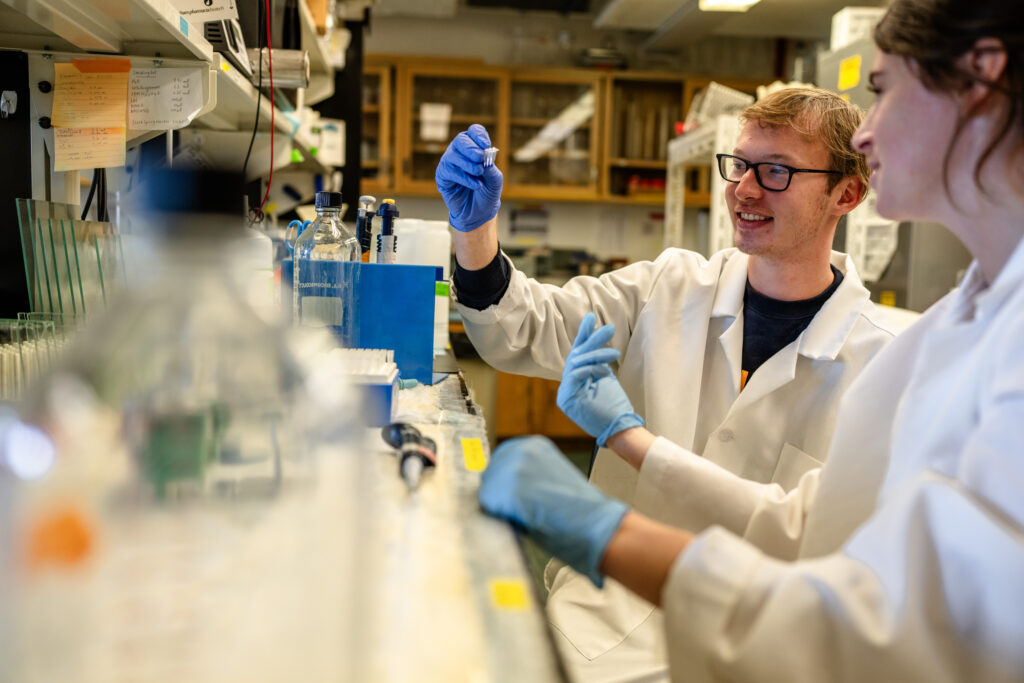
Prime research opportunities
But students enrolled in biological sciences do so at an even higher rate: one in three of all declared sophomores and juniors, reports Dr. Michelle Mynlieff, professor and chair of the department. An even higher rate is very likely, after a planned survey to capture the experiences of seniors and declared first-year students. These numbers reflect a commitment from faculty, as they secure significant grant funding for their research, to allocate a portion of their awards to dedicated student research positions.
On average, the department annually hosts 30 students for summer research. When accounting for lab projects as part of course work, summer research programs and work study, biological sciences majors are participating in high-impact research at an impressive rate.
An unprecedented level of funding sets the Department of Biological Sciences up for success, including these prominent examples.
Research leadership
Studying hereditary genetics in reptiles, Dr. Tony “Gecko” Gamble, professor, has grants from the NSF and National Institutes of Health totaling $3.3 million. Dr. Stefan Schnitzer, Mellon Distinguished Professor, has a multiyear NSF grant of $915,000, examining vine or liana growth in tropical forests as part of one of the longest-running tropical plant experiments ever conceived.
Assistant Professor Nate Lemoine studies the effects of extreme drought on grassland ecosystems — research that has been supported by an $809,000 NSF grant. He has another NSF grant under his belt totaling $460,000 where he researches the effects of elephant carcasses on African savanna ecosystems.
Dr. Joseph LaManna, assistant professor, is heading an NSF grant of roughly $815,000 to explore how native microorganisms adapt under the stress of shifting climates. A $650,000 grant from the U.S. Department of Agriculture allows Dr. Michael Schläppi, professor, to study cold tolerance in rice with a goal of expanding its planting season.
Dr. Chelsea Cook, assistant professor, received a $755,000 NSF grant to study animal behavioral responses — studying honeybees and how they respond and communicate temperature changes, including how entire colonies regulate temperature.
The department led all others at Marquette in bringing new extramural research funding to campus — at an impressive $8.1 million awarded in fiscal year 2023 alone.
Principal investigator and professor Dr. Krassi Hristova also leads the second phase of Defense of Water, Marquette’s largest-ever federally funded water quality and safety research. Hristova was pivotal in securing this $3.8 million second-phase funding, which furthers biological sciences research in biochemical PFAS remediation and antimicrobial resistance, as well as projects involving faculty from engineering, political science, law, business and education.
Through a variety of awards and subawards, the department led all others at Marquette in bringing new extramural research funding to campus — at an impressive $8.1 million awarded in fiscal year 2023 alone.
“The power of research in biological sciences at Marquette is not only extraordinary outcomes, but the collaboration with students and the effects on students’ lives,” says Dr. Heidi Bostic, dean of the Klingler College of Arts and Sciences. For undergraduate and graduate students alike, that can include contributing to published research — “every paper we publish includes student authors,” explains Manogaran.
As for working with Manogaran, Sean Martin, who has been with the Manogaran lab since his freshman year, says, “Her style is perfect — she provides some structure while giving me the room to apply my knowledge and grow as a scientist.”
The student experience and teacher-scholar model
Manogaran’s Foundations of Biological Inquiry course, developed in 2013 and deployed in 2014, was created to ensure research experiences for biological sciences majors started as early as their freshman year. Of 13 in the initial cohort, eight went on to medical school or Ph.D. programs. “You can see how diving in right away into an intense science exploration directly impacted their trajectory,” says Manogaran. “This starts early because of the philosophy in our department.”
“Dr. Manogaran’s style is perfect — she provides some structure while giving me the room to apply my knowledge and grow as a scientist.”
Sean Martin, junior
This course is now taught annually by a different professor: Dr. Rosemary Stuart, Dr. Martin St. Maurice, Dr. Hristova or Dr. Schläppi. Rotating the faculty allows the course to have a different research focus each year and allows faculty to tie the course to their current grant work. These students quickly acquire laboratory and critical thinking skills they then apply to their other lab courses and research opportunities.
Encouraging students to grow as scholars is natural when built into the curriculum — a philosophy Dr. Lisa Petrella applies large and small to her 250-person lectures, smaller capstone courses and her guidance of independent study projects. Petrella, associate professor, examines temperature stress on organisms through a current award and has a pending award for nearly $460,000 from the NIH slated to begin this summer, through which she’ll expand her research. “It’s very exciting. We’ll test crucial cell structures that are necessary for animals to be fertile during hot summer temperatures. If we can make these structures more stable, we can change a species’ genetic response to temperature and look at disrupting the loss of fertility,” she says.
Petrella co-directs a graduate-level program providing stipends to students in need. Suspending TA-ing and allocating travel funds for regional and national conferences, the Graduate Assistance in Areas of National Need (GAANN) Program is supported by a $608,000 award granted in 2021 from the U.S. Department of Education. “This has a profound effect on our graduate students — they can focus exclusively on research. It really allows them to succeed,” Petrella says.
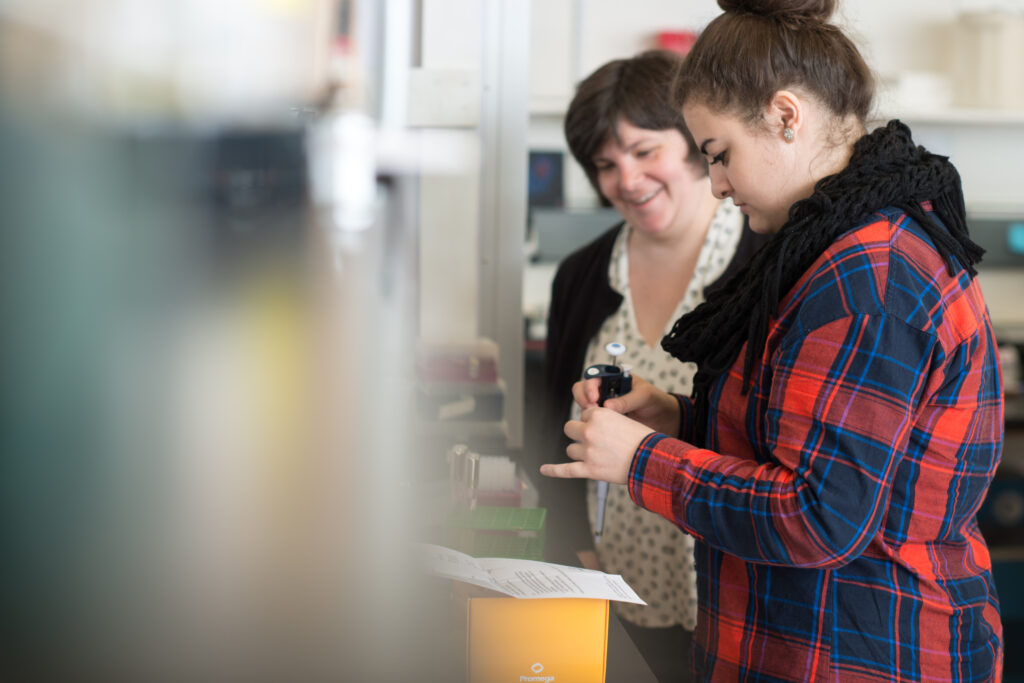
In many labs, graduate students are paired with and mentor underclassmen. Drawing these graduate students to Marquette at a time when higher education is watching enrollment trends — biological sciences is a top three Ph.D. program across the university based on enrollment.
Planning for the future
Dr. Michael R. Lovell’s 10th presidential address this January included the announcement that biological sciences and biomedical sciences will be included as priorities in the next phase of campus master planning.
The university’s previous master plan, completed in 2016, helped guide a wave of transformative capital projects on campus, including The Commons residence hall and new homes for Marquette Business and the College of Nursing. Now, a new planning process will get underway to examine Marquette’s physical needs for the coming decade or more, integrating a vision for academic, research and student success.
Lora Strigens, vice president for planning and facilities management, will lead this careful and deliberative process, considering issues such as enrollment levels, teaching activity and research growth, as well as the deferred maintenance and other challenges that exist in the older facilities used by both departments.
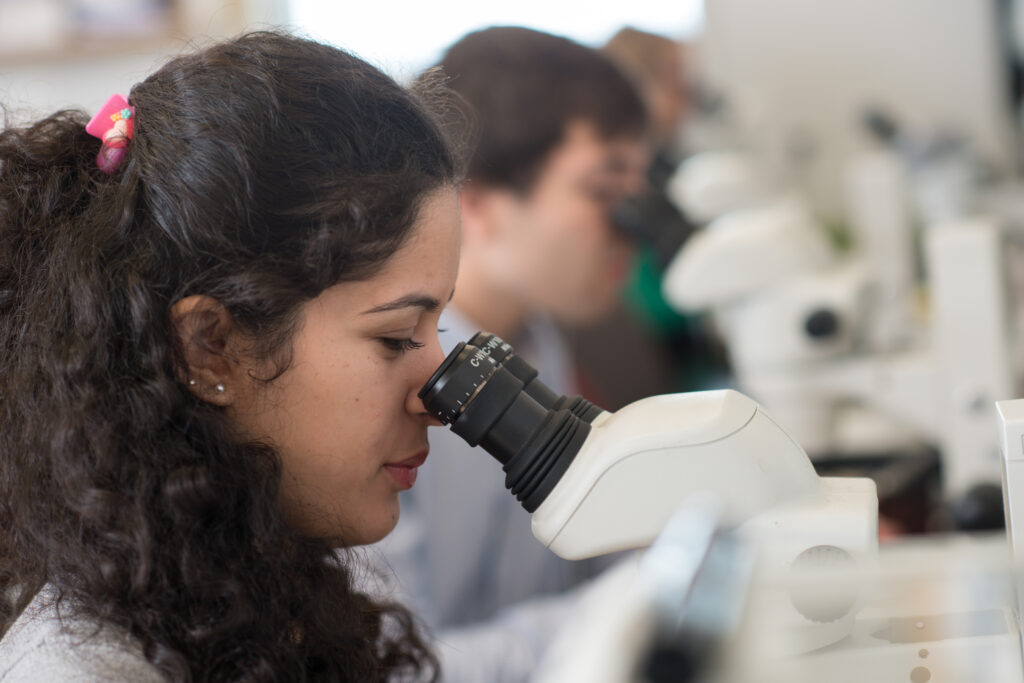
The planning process will be highly collaborative across the Klingler College of Arts and Sciences and the College of Health Sciences, which houses the Biomedical Sciences Department, providing key input needed to inform decisions and direct this effort. University Advancement will play an important role in helping both colleges secure support.
Strigens says addressing facility needs for the sciences at Marquette is going to require strategic and thoughtful decision-making, involve new and existing spaces, require the exploration of phased implementation, and require significant capital funding.
Dean Bostic, the college and department are eager to pursue this vision. She noted the growth of research at the university: “It’s exciting to think of the excellence of faculty in biological sciences and biomedical sciences being matched by the excellence of the facilities where they do their work. The new, innovative environment will make a transformational difference and enable us to achieve things we can only dream about now.”
Biological Sciences is a top three Ph.D. program across the university based on enrollment.
Dr. Emily Sontag, assistant professor, researches amyloid proteins that cause dementia. Her research to develop therapies for patients with Huntington’s disease would benefit from improved facilities. “It could move this research forward — allowing us to apply our findings to patient cells,” Sontag says. Moreover, her lab focuses on special proteins — termed chaperones — that guide problematic misfolded proteins away from causing more damage.
“Inspiring our students to dream big and encouraging them to collaborate, explore their passions, network and advance society — that’s the type of environment we want to facilitate,” says Dr. Deanna Arble, who is a member of the interdisciplinary planning group focused on science facilities and an assistant professor studying how the brain interfaces with disease, such as obesity and sleep apnea.
The department, college and university continue to plan for the next generation of scientists and their mentors — where the bar for research excellence and transformative student experiences has already been set quite high.

